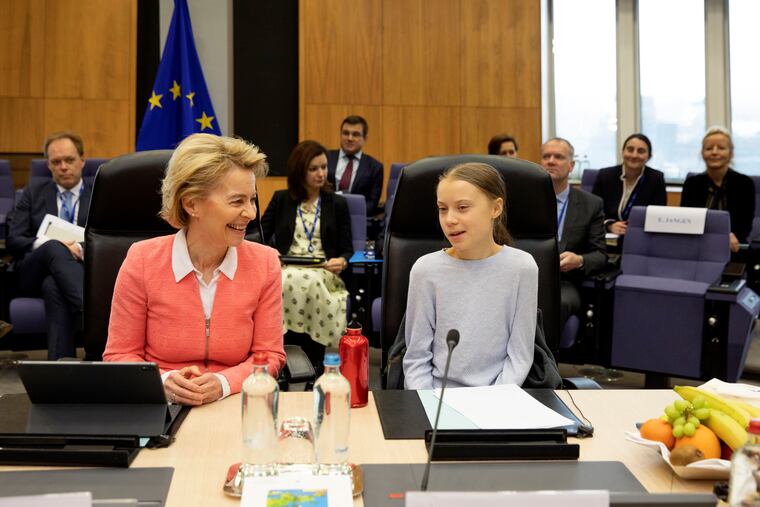E.U. commission unveils climate law amid criticism
Amid fierce criticism from environmental activists, the European Commission unveiled plans Wednesday for its first ever climate law, which will act as the basis of the European Union's aim to make the 27-country bloc climate neutral by 2050.

BRUSSELS — Amid fierce criticism from environmental activists, the European Commission unveiled plans Wednesday for its first ever climate law, which will act as the basis of the European Union’s aim to make the 27-country bloc climate neutral by 2050.
Under its Green Deal agenda, the EU's executive arm wants to legislate to make its ambition of cutting greenhouse gas emissions to zero by mid-century irreversible, and legally-binding for all member states.
“This climate law will set in stone Europe's position as a climate leader on the global stage," said European Commission president Ursula von der Leyen.
To establish the 2050 goal, the European Commission is proposing a mechanism for regularly raising the EU’s emissions reduction target over the next three decades. However, there is no plan to increase the bloc's overall emissions goal for 2030.
This particular point has been criticized by climate activists, who claim that delaying the upgraded 2030 target is detrimental to the bloc's credibility in the fight against climate change.
The commission only said it would present a “responsible” plan by September on how to raise its current 2030 target of reducing greenhouse gases by 40% from 1990 levels to “at least 50% and towards 55%."
Environmental group Greenpeace voiced concerns that EU governments will “find it extremely difficult to agree a new target" before the next round of U.N climate talks in Glasgow, Scotland, in November.
A dozen of member states have also expressed their concern and have asked the commission to come up with a 2030 target “as soon as possible and by June 2020 at the latest in order to advance discussions in a timely manner."
Climate activist Greta Thunberg, who attended Wednesday's climate discussions with EU commissioners, dismissed the proposed law.
In an open letter, 34 youth climate activists, including Thunberg, stressed that instead of setting long-term goals, the EU should focus on emissions of carbon dioxide right now if the world is to meet the commitments made five years ago at the Paris climate summit.
Thunberg and her colleagues in the youth climate movement have been pressing governments to focus on so-called CO2 budgets — the amount of CO2 that can be emitted to keep global warming below 2 degrees Celsius (3.6 Fahrenheit), and ideally no more than 1.5 C by the end of the century.
But scientists say countries will miss both of those goals by a wide margin unless drastic steps are taken to begin cutting greenhouse gas emissions this year. The European Centre for Medium-Range Weather Forecasts said Wednesday that Europe had “the warmest January on record, about 0.2 degrees Celsius warmer than the previous warmest January in 2007, and 3.1 C warmer than the average January in the period 1981-2010. Average temperatures were especially high over large parts of northeastern Europe, in some areas more than 6 C above the 1981-2010 January average."
Greenpeace also insists a 55% reduction target for 2030 is insufficient in limiting global heating to 2 C. Environmental group WWF is recommending a cut of at least 65% and is urging the EU to ban subsidies and tax breaks for fossil fuels industries as well as setting up an independent scientific body to supervise the EU's climate change plans.
Green members of the European Parliament accused von der Leyen of giving up her claim to lead in the global climate debate.
“In the face of Greta, she is breaking her promise to present ambitious climate targets for 2030," Green lawmaker Michael Bloss said.
To set a common trajectory and impose revised targets to member states every five years from 2023, the commission is planning to adopt legally binding legislation that can enter into force if the European Parliament and European Council, the EU body that represents governments, have no objections.
That mechanism could spark concerns among fossil fuel-dependent EU nations, which need to rejig their economies to reach the 2050 target agreed last year by all EU members except Poland.
To finance the climate transition, the EU plans to dedicate a quarter of its budget to tackling climate change and to work to mobilize 1 trillion euros ($1.1 trillion) in investment over the next 10 years. The financial plan includes a mechanism designed to help the regions that would be most disrupted economically by the transition to cleaner industries.
Von der Leyen added that the commission started working on devising a “carbon border adjustment mechanism" aimed at avoiding a situation where EU countries reduce emissions as part of their ambition to make the continent carbon neutral by 2050, but at the same time import CO2 embedded in goods.
French President Emmanuel Macron has been promoting the idea of a carbon tax at the bloc's borders for countries that did not sign up to the 2015 Paris agreement and do not regulate CO2 emissions as strictly as the EU does.
Frank Jordans in Berlin contributed to this article.